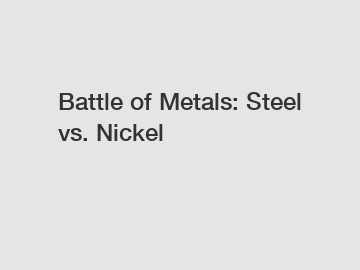Battle of Metals: Steel vs. Nickel
Battle of Metals: Steel vs. Nickel?
In the world of metals, steel and nickel are two heavyweights that have captivated industries for centuries. Both metals possess exceptional properties, making them indispensable in various applications. However, when it comes to the ultimate showdown between steel and nickel, which metal truly reigns supreme? Let's delve deeper into the characteristics, uses, advantages, and disadvantages of steel and nickel to find out.
Steel:

1. Versatility:
Steel has been the backbone of countless industries due to its remarkable versatility. It can be easily shaped and molded into various forms, making it ideal for construction, transportation, machinery, and even kitchen utensils. Its inherent strength and durability make it a go-to choice in engineering and infrastructure projects.
2. Cost Efficiency:
Steel stands as a cost-effective option for many applications. It is widespread, readily available, and comparatively inexpensive, making it a popular choice for large-scale projects. Moreover, steel's ease of fabrication and recyclability contribute to its economical advantage.
3. Strength:
With its exceptional tensile strength and high resilience, steel is renowned for its ability to withstand immense pressure and heavy loads. This outstanding strength makes it a perfect fit for bridges, buildings, and other critical structures that require longevity and structural integrity.
4. Corrosion Resistance:
Although steel exhibits decent corrosion resistance, it is not impervious to oxidation. To combat this drawback, steel is often alloyed with other metals, such as chromium and nickel, to create stainless steel. Stainless steel's corrosion-resistant qualities make it highly suitable for applications involving exposure to moisture or corrosive substances.
Nickel:
1. High Temperature Performance:
Nickel shines in high-temperature environments, making it an invaluable material in industries such as aerospace, power generation, and chemical processing. Its ability to retain strength and resist deformation at extreme temperatures sets it apart from many other metals.
2. Excellent Chemical Resistance:
Nickel's resistance to corrosive substances, including acids and alkalis, makes it highly desirable in chemical plants and laboratories. The metal's ability to maintain its structural integrity even in harsh chemical environments ensures the safety and longevity of equipment and infrastructure.
3. Magnetic Attributes:
Unlike steel, which is primarily non-magnetic, nickel exhibits ferromagnetic properties. This unique feature enables nickel to be utilized in the production of magnets, electrical conductors, and various electronics applications.
4. Alloying Capabilities:
One of nickel's greatest strengths lies in its ability to enhance the properties of other metals. Nickel alloys, such as Inconel and Monel, are widely used due to their superior heat resistance, strength, and excellent corrosion resistance. These alloys find applications in critical sectors like aerospace, marine, and petrochemical industries.
Conclusion:
Now that we have examined the characteristics, uses, advantages, and disadvantages of steel and nickel, it is clear that both metals bring substantial benefits to different fields. Steel delivers exceptional strength, versatility, and cost efficiency, making it an ideal material for many industries. On the other hand, nickel's outstanding high-temperature performance, chemical resistance, and alloying capabilities make it essential in sectors requiring specialized properties. Rather than being rivals, steel and nickel complement each other, proving that the battle of metals is not about picking a winner but appreciating the unique capabilities each metal brings to different applications.
If you want to learn more, please visit our website astm a511, nickel alloy steel pipe, alloy 601 pipe.

Comments